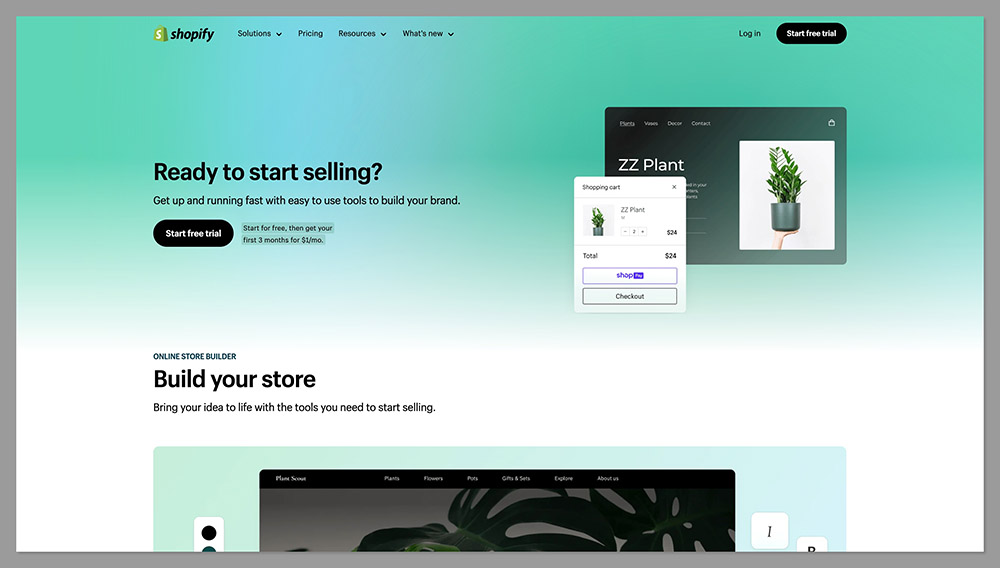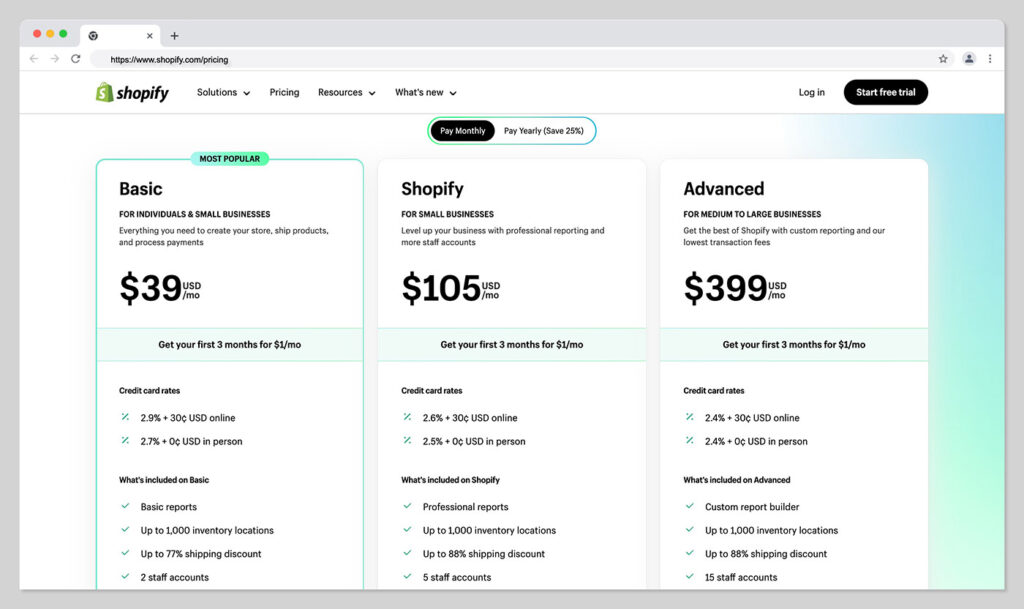Gumroad and Shopify are both convenient, easy-to-use tools for ecommerce merchants. However, Shopify is definitely the more feature-rich and scalable solution.
While Gumroad makes it easy to get started online, Shopify gives you the tools you need to scale your business, whether you’re selling physical products, digital products, or items in-person. It comes with built-in SEO tools, exceptional templates, and advanced features for customer management.
Plus, the online platform has some fantastic inventory management tools and integrations with shipping solutions to make running your business easier.
Shopify is definitely one of the most well-known platforms, powering millions of stores worldwide.
In comparison, Gumroad is more of an “underdog”. However, that doesn’t mean it’s not worth consideration.
To help you make the right choice between the two platforms, we’ve taken a closer look at all of their core features, capabilities, and pricing.
Read on for everything you need to know about Gumroad and Shopify.
Quick Verdict
We’d recommend Shopify as our number one choice for ecommerce merchants. While Gumroad is easy to use, Shopify offers a lot more versatility, with omnichannel sales options, built-in payment processing, and even access to a dedicated POS software solution.
Table of contents:
- Full solution from $29/month
- Limited time offer: first 3 months for $1/month
- SEO Friendly
- Offline Store
- App Store
- 24/7 Support
- Beautiful Templates
Gumroad vs Shopify: The Main Differences
Here are some of the biggest differences between Shopify and Gumroad:
- Product options: Gumroad is primarily a tool for selling digital products, such as downloads, eBooks, and online courses. With Shopify, you can sell anything, including physical items, dropshipping goods, print on demand items, and subscriptions.
- Platform: With Shopify, you can only build a Shopify store, there’s no option to “embed” features into other platforms, although you can create “buy buttons” with the Starter plan. Gumroad allows you to add its full page editor to a different website platform.
- Advanced features: Shopify has a lot more features to explore for marketing, inventory management, order management, and fulfillment. Gumroad focuses more on design solutions, and the creation of keys for digital products, or online memberships.
Shopify vs Gumroad: The Features
Both Shopify and Gumroad have a great selection of features on offer for ecommerce store owners, but they focus on slightly different audiences. Here are the primary capabilities and functionality you’ll find on both platforms.
Shopify’s Key Features
Shopify has a ton of features to explore, but some of the main capabilities include:
- Website builder: With Shopify, you get all the tools you need to build an amazing storefront, including templates, and a user-friendly page editor. There are tons of customization options available, and you can even implement your own custom domain.
- Commerce: Shopify has one of the most flexible toolkits for online selling. you can sell everything from digital goods to physical items. There’s even the option to leverage Shopify’s POS solutions for in-person selling.
- Payment processing: While you can use third-party payment gateways like PayPal with Shopify, the cheapest option is to use Shopify Payments, the integrated payment processor, which supports credit card and debit card payments, as well as various digital wallets.
- Marketing: Shopify comes with built-in tools to help boost your online presence, such as SEO-friendly pages, the option to build a blog, and social media marketing tools. You can also use the Shopify app store to connect to an email marketing tool.
- Business management: Shopify makes it easy to track everything from your tax and VAT information, to orders, inventory, and analytics in one place. You can even automate aspects of your company with Shopify Flow.
- Analytics: Speaking of analytics and reporting, Shopify provides fantastic insights into all of the data behind your business operations, helping users make intelligent decisions about growth.
Gumroad’s key features
Gumroad’s key features include:
- Page editor: Gumroad’s flexible page editor allows you to create a full storefront with Gumroad, or leverage new features within your existing website platform. You can easily embed the company’s payment platform into your existing site.
- Memberships and subscriptions: Companies can easily design membership and subscription options for customers, and set up specific cadences for how customers should pay. You can even allow customers to choose what they pay for your product.
- Payments: With Gumroad, you can accept multiple currencies with different payment processing tools, automatically generate VAT information, and even create discount codes and offers for your customers.
- Digital sales: Gumroad focuses specifically on the sale of digital products. You can generate license fees for software, and sell multiple versions of different downloadable products. Plus, the company can create lightweight DRM features for protection.
- Analytics: Gumroad provides basic insights into your sales and new opportunities, with reporting and analytical tools. It also helps you grow your audience with email broadcasts, automated workflows, and social integrations
The winner
While Gumroad is a great tool for selling digital products, Shopify wins overall thanks to its broader, more comprehensive feature set. With Shopify you can really sell any kind of product, anywhere in the world. The company supports comprehensive multichannel and international sales.
Plus, the comprehensive app market connected to Shopify means you’ll have no problem extending the functionality of your store as your business grows.
Shopify vs Gumroad: Ease of Use
If you’re looking for a user-friendly interface within your ecommerce platform, you can’t really go wrong with either Shopify or Gumroad. Both have clean and intuitive dashboards that are easy to navigate, even for beginners.
Shopify

Shopify has a fantastic backend environment that makes it easy for anyone to get started. You can sign up for an account in seconds, and instantly access countless templates and tools to bring your business to life. The theme editor is easy-to-use, with simple drag-and-drop components.
Plus, Shopify provides access to automation tools and other features that can make it easier to run your business as it grows.
Building new pages, and showcasing products is simple. Plus, you can even use third-party apps to automatically embed information from dropshipping providers and POD companies into your product page in a few seconds.
Gumroad

With Gumroad, creating compelling pages and shopping experiences is extremely easy. If you’re a small business selling digital downloads and courses, Gumroad has everything you need to get started. You can build an entire website storefront in a few minutes, with attractive templates.
Alternatively, you can use the Gumroad plugin on your existing website, to rapidly add sales features to your online presence. Gumroad’s page editor is extremely flexible, and you can even import all of your contact details and customer information into the platform in seconds.
The interface is clean and simple, and there’s plenty of support available on the Gumroad website if you’re brand-new to website building.
The Winner
Gumroad is a little simpler to use overall, simply because there are fewer features to master than you’ll get with Shopify. However, both tools are extremely convenient for beginners, and don’t require any prior coding or programming knowledge.
Shopify vs Gumroad: Customer Support
The best ecommerce platform will always be easy to use, but when you’re launching a new startup or business venture, sometimes you will need extra support.
Shopify Customer Support
From your Shopify backend, you can easily connect with experts through email, live chat, or phone in certain parts of the world. You’ll also be able to hire Shopify Experts directly through the platform, to help with things like customizing your checkout or theme.
Shopify also has some of the best resources available to beginners, such as guides and videos, blog posts, FAQs, and more. There’s even an online community if you want to source help from peers.
Gumroad Customer Support
The best way to get support from Gumroad is via the company’s “help center” which includes numerous articles for things like opening an account and selling online. If you do need extra assistance, you can reach out to the team via live chat, and they’ll usually respond within 24 hours.
Unfortunately, there doesn’t appear to be any options for contacting the team via phone, but you can interact with Gumroad on social media, and via email.
Winner
Shopify goes a little further than Gumroad to ensure customers feel supported. There are more ways to reach out to the team, and hire an expert. Plus, you’ll have more resources to explore, such as videos and guides you won’t get with Gumroad.
Shopify and Gumroad Pricing Plans
Gumroad and Shopify take a very different approach to pricing. While there are numerous pricing packages for Shopify, depending on your business size, Gumroad only offers one pricing option.
Shopify Pricing

Shopify has 3 core pricing plans, as well as an enterprise plan, and a “starter” option for customers who just want to add a buy button to social media and existing websites. The Starter plan costs $5 per month, but it comes with transaction fees of around 5%.
The core plans include:
- Basic: $39 per month for the full website building capabilities, SSL certificates, payment processing, 1,000 inventory locations, marketing tools, 2 staff accounts and more.
- Shopify: $105 per month for the features of Basic, plus multi-channel global selling, 5 staff accounts, shipping discounts, and professional reports.
- Advanced: $399 per month for all the features of Shopify plus up to 15 staff accounts, import tax management, and more advanced, custom reports.
The monthly fee for the enterprise plan, “Shopify Plus” depends on your specific needs, but prices often start at around $2,000 per month. This plan includes more unique integrations, API access, and customization features. Notably, all Shopify plans have transaction fees to consider, and you’ll need to pay extra if you want to use a third-party payment processor (other than Shopify Payments).
Gumroad Pricing

There’s no monthly fee at all for Gumroad. Instead, you pay a 10% flat rate on all of the transactions you process through the platform. On the one hand, this means Gumroad only makes money when you do. However, it also means you’ll miss out on a portion of your profits each month.
This makes Gumroad a good option for small business beginners, but as your company scales, you might struggle to retain high profit margins.
Winner
Gumroad is the cheaper option for an online business making minimal sales. However, if you want to scale your business rapidly, the high commission fees could quickly eat into your profits. We’d recommend considering Shopify’s Starter plan as an alternative.
Shopify and Gumroad: Top Alternatives
If neither Shopify nor Gumroad are ideal for your online store, then there are plenty of other options you can consider instead. Some of our top picks include:
- Wix: One of the easiest website builders on the market today, Wix combines convenient themes and business management tools with AI capabilities. It allows companies to sell everything, from digital downloads, to physical products. Plus, it’s one of the most affordable platforms available, making it ideal for beginners.
- Squarespace: If you’re selling creative products, Squarespace is a fantastic tool, with highly appealing professional templates and editing features. Plus, it comes with the option to create subscriptions and memberships, just like Gumroad and Shopify. Squarespace does lack some flexibility and scalability, however.
- Sellfy: Sellfy is a great choice if you’re a creator looking to sell physical and digital products from one place. You can create community environments, and even sell print-on-demand products through Sellfy with minimal effort. Plus, there are built-in marketing features, and the option to embed your store into an existing platform, like WordPress.
The Verdict: Gumroad or Shopify?
In our opinion, Shopify is the best platform for online business owners looking for scalability and flexibility. You can integrate your store with social media and marketplaces like Amazon, easily access a range of marketing tools, and process payments with ease.
Plus, Shopify makes it easy to expand your sales into the real world, with it’s convenient point of sale technology.
However, Gumroad could be a good option for creators who want to sell digital products with minimal effort.
There are no monthly fees, and the page editor is intuitive and convenient. Plus, you can embed your sales features into any existing website you might have.
Further reading 📚
FAQ
Shopify is a comprehensive omnichannel commerce platform which allows companies to sell virtually any kind of product (physical or digital) across a range of platforms. Gumroad focuses on the sale of digital products, such as memberships, downloads, and courses.
Technically, the only way to integrate Gumroad with Shopify is to use a tool like Zapier. However, you probably wouldn’t need to access Gumroad if you already have all the features Shopify offers for selling digital products.
Gumroad is a convenient and simple tool for online merchants selling basic products. However, it’s not the best choice if you want to sell physical items. Gumroad is mostly intended for selling digital products.
If you’re searching for a hosted storefront or you want to add sales capabilities to an existing website, Gumroad is a great choice. However, if you’re looking for a creative marketplace that already has an active online audience, Etsy is the better choice.
Shopify offers decent value for money, including Starter packages which only cost around $5 per month. However, it can be more expensive than some other platforms, particularly when you consider transaction and payment processing fees.
You can’t really sell any physical products on Gumroad. Plus, you can’t sell Steam keys, hacks to other websites, or pornographic content.
No, Gumroad just gives creators the tools they need to sell digital products. You’ll be responsible for promoting your business and your solutions yourself.





Comments 0 Responses